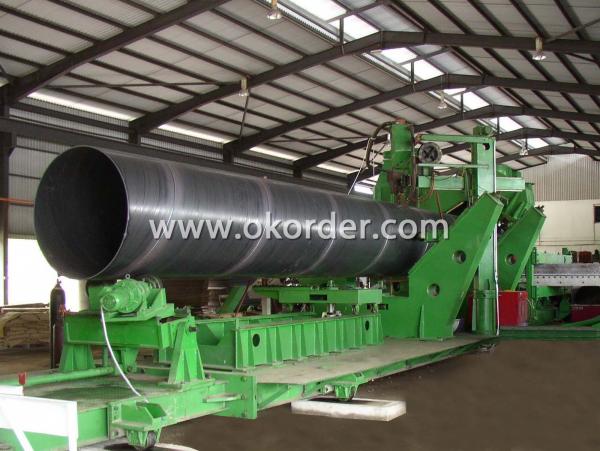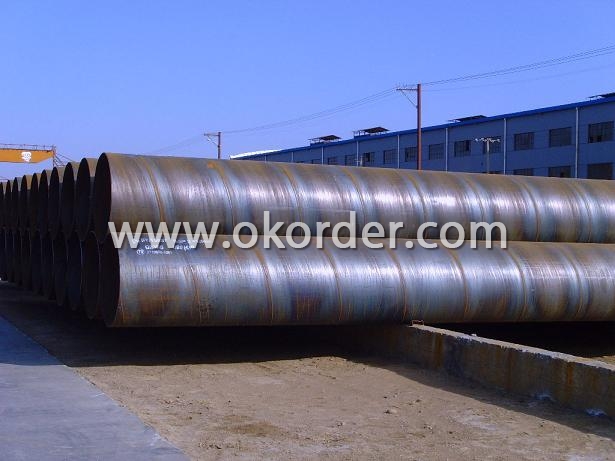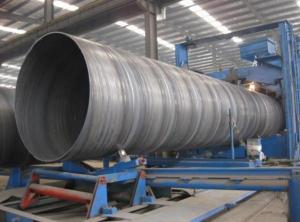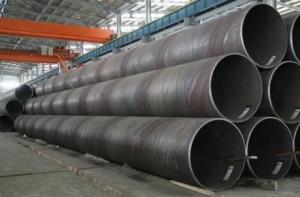SSAW Welded Steel Pipes Carbon API SPEC 5CT ASTM A53
- Loading Port:
- Tianjin Port
- Payment Terms:
- TT or L/C
- Min Order Qty:
- 50MT m.t.
- Supply Capability:
- based on order m.t./month
OKorder Service Pledge
OKorder Financial Service
You Might Also Like
1.Specification of SSAW Welded Steel Pipes Carbon API SPEC 5CT ASTM A53
1)Application: It is widely applied to line pipe in oil and sewage transportation , and it is used in Low pressure liquid and gassy transportation and it is also good Structure pipe in building and bridge field.
2)Standard: API SPEC 5L, API SPEC 5CT, ASTM A53, GB/T9700.1
3)Steel Grade: API SPEC 5L: B, X42, X46, X52, X56, X60, X65;API SPEC 5CT: J55, K55, N80, L80-1; ASTM A53: A, B, C; GB/T9700.1:L242、L290、L320、L360、L390、L415、L450
2.Sizes of Pipes
*Remark: Besides below sizes, we also can arrange production based on requirement of customers
|
OD |
WT | ||||||||
|
NoninalPipe size Inches |
OD MM |
10 |
20 |
30 |
STD |
40 |
60 |
XS |
80 |
|
12 |
323.90 |
|
6.35 |
8.38 |
9.53 |
10.31 |
14.27 |
12.70 |
17.48 |
|
14 |
355.60 |
6.35 |
7.92 |
9.53 |
9.53 |
11.13 |
15.09 |
12.70 |
19.05 |
|
16 |
406.40 |
6.35 |
7.92 |
9.53 |
9.53 |
12.7 |
16.66 |
12.70 |
21.44 |
|
18 |
457.00 |
6.35 |
7.92 |
11.13 |
9.53 |
14.27 |
19.05 |
12.70 |
23.88 |
|
20 |
508.00 |
6.35 |
9.53 |
12.7 |
9.53 |
15.09 |
20.62 |
12.70 |
26.19 |
|
22 |
559.00 |
6.35 |
9.53 |
12.7 |
9.53 |
|
22.23 |
12.70 |
28.58 |
|
24 |
610.00 |
6.35 |
9.53 |
14.27 |
9.53 |
17.48 |
24.61 |
12.70 |
30.96 |
|
26 |
660.00 |
7.92 |
12.70 |
|
9.53 |
|
|
12.70 |
|
|
28 |
711.00 |
7.92 |
12.70 |
15.88 |
9.53 |
|
|
12.70 |
|
|
30 |
762.00 |
7.92 |
12.70 |
15.88 |
9.53 |
|
|
12.70 |
|
|
32 |
813.00 |
7.92 |
12.70 |
15.88 |
9.53 |
17.48 |
|
12.70 |
|
|
34 |
864.00 |
7.92 |
12.70 |
15.88 |
9.53 |
17.48 |
|
12.70 |
|
|
36 |
914.00 |
7.92 |
12.70 |
15.88 |
9.53 |
19.05 |
|
12.70 |
|
|
38 |
965.00 |
|
|
|
9.53 |
|
|
12.70 |
|
|
40 |
1016.00 |
|
|
|
9.53 |
|
|
12.70 |
|
|
42 |
1067.00 |
|
|
|
9.53 |
|
|
12.70 |
|
|
44 |
1118.00 |
|
|
|
9.53 |
|
|
12.70 |
|
|
46 |
1168.00 |
|
|
|
9.53 |
|
|
12.70 |
|
|
48 |
1219.00 |
|
|
|
9.53 |
|
|
12.70 |
|
3. Packing & Delivery
Packing Detail: Bundles with anti-rust painting and with plastic caps
Delivery Term: 30 days after receving payment or L/C
4. Data Sheet
Standard: API SPEC 5L
Mechanical Properties
|
Standard |
Grade |
(MPa) |
(MPa) | ||
|
Yield strength |
Tensile Strength | ||||
|
API SPEC 5L |
PSL1 | ||||
|
B |
≥241 |
≥414 | |||
|
×42 |
≥290 |
≥414 | |||
|
×46 |
≥317 |
≥434 | |||
|
×52 |
≥359 |
≥455 | |||
|
×56 |
≥386 |
≥490 | |||
|
×60 |
≥414 |
≥517 | |||
|
×65 |
≥448 |
≥531 | |||
|
×70 |
≥483 |
≥565 | |||
|
PSL2 | |||||
|
Min |
Max |
Min |
Max | ||
|
B |
241 |
448 |
441 |
758 | |
|
×42 |
290 |
496 |
414 |
758 | |
|
×46 |
317 |
524 |
434 |
758 | |
|
×52 |
359 |
531 |
455 |
758 | |
|
×56 |
386 |
544 |
490 |
758 | |
|
×60 |
414 |
565 |
517 |
758 | |
|
×65 |
448 |
600 |
531 |
758 | |
|
×70 |
483 |
621 |
565 |
758 | |
Chemical Composition(%)
|
Standard |
Grade |
C |
Mn |
P |
S |
TI |
CEV |
|
Max |
Max |
Max |
Max |
Max |
Max | ||
|
API SPEC 5L |
PSL1 | ||||||
|
B |
0.26 |
1.2 |
0.030 |
0.030 |
0.04 |
- | |
|
×42 |
0.26 |
1.3 |
0.030 |
0.030 |
0.04 | ||
|
×46,×52,×56,X60 |
0.26 |
1.4 |
0.030 |
0.030 |
0.04 | ||
|
X65 |
0.26 |
1.45 |
0.030 |
0.030 |
0.06 | ||
|
X70 |
0.26 |
1.65 |
0.030 |
0.030 |
0.06 | ||
|
PSL2 | |||||||
|
B |
0.22 |
1.20 |
0.025 |
0.015 |
0.04 |
0.43 | |
|
×42 |
0.22 |
1.30 |
0.025 |
0.015 |
0.04 | ||
|
×46,×52,×56, X60 |
0.22 |
1.40 |
0.025 |
0.015 |
0.04 | ||
|
X65 |
0.22 |
1.45 |
0.025 |
0.015 |
0.06 | ||
|
X70 |
0.22 |
1.65 |
0.025 |
0.015 |
0.06 | ||
Standard: ASTM A53
Mechanical Properties
|
Standard |
Grade |
(MPa) |
(MPa) |
|
Yield strength |
Tensile Strength | ||
|
ASTM A53M |
A |
205 |
330 |
|
B |
240 |
415 |
Chemical Composition(%)
|
Standard |
Grade |
C |
Mn |
P |
S |
V |
Ni |
Cu |
Cr |
Mo |
|
Max |
Max |
Max |
Max |
Max |
Max |
Max |
Max |
Max | ||
|
ASTM A53M |
A |
0.25 |
0.95 |
0.05 |
0.045 |
0.08 |
0.4 |
0.5 |
0.4 |
0.15 |
|
B |
0.30 |
1.20 |
0.05 |
0.045 |
0.08 |
0.4 |
0.5 |
0.4 |
0.15 |
5. Products Showroom


- Q:Can steel pipes be used for the construction of dams?
- Yes, steel pipes can be used for the construction of dams. Steel pipes are strong, durable, and have a high load-bearing capacity, making them suitable for various applications in dam construction, such as for penstocks, spillways, and drainage systems. They can withstand the pressure and weight exerted by water and are resistant to corrosion, which is crucial for the long-term stability and integrity of dams. Additionally, steel pipes can be easily fabricated and installed, making them a practical choice for dam construction projects.
- Q:What is the cost of steel pipes compared to other materials?
- The cost of steel pipes compared to other materials can vary depending on factors such as size, grade, and market conditions. However, in general, steel pipes tend to be more cost-effective and economical compared to other materials like copper or PVC. Steel is a durable and versatile material that offers excellent strength and longevity, making it a preferred choice in various industries such as construction, oil and gas, and plumbing.
- Q:How are steel pipes protected against external moisture?
- Steel pipes are protected against external moisture through a variety of methods. One common method is the application of a protective coating or paint on the surface of the pipes. This coating acts as a barrier, preventing moisture from coming into direct contact with the steel. The coating can be made of different materials, such as epoxy, polyethylene, or zinc, depending on the specific requirements and environment. Another method of protection is through the use of corrosion inhibitors. These inhibitors are added to the internal or external surfaces of the pipes, forming a protective layer that prevents moisture from causing corrosion. Corrosion inhibitors can be in the form of chemicals, such as rust converters or rust preventatives, which react with the steel to form a protective barrier. Additionally, steel pipes can be protected against external moisture through cathodic protection. This technique involves the use of sacrificial anodes or impressed current to create an electric current that protects the steel. Sacrificial anodes, typically made of zinc, aluminum, or magnesium, are attached to the steel pipes and corrode over time instead of the steel, thus preventing moisture-induced corrosion. Furthermore, proper insulation and waterproofing measures are crucial in protecting steel pipes from external moisture. Insulation materials, such as foam or tape, are applied to the pipes to provide an additional layer of protection and prevent moisture infiltration. Waterproofing measures, such as the use of sealants or membranes, can also be implemented to ensure that no moisture seeps into the pipes. Regular maintenance, including inspections and repairs, is essential to ensure the continued protection of steel pipes against external moisture. By promptly addressing any areas of damage or corrosion, the integrity of the protective measures can be maintained, prolonging the lifespan of the steel pipes and preventing costly repairs or replacements in the future.
- Q:Are steel pipes suitable for conveying fluids?
- Yes, steel pipes are suitable for conveying fluids. Steel pipes have been widely used in various industries for many years due to their durability, strength, and resistance to corrosion. These qualities make steel pipes an ideal choice for conveying fluids such as water, oil, gas, and even hazardous chemicals. The smooth interior surface of steel pipes also allows for efficient flow and prevents clogging, making them suitable for applications that require a continuous and smooth flow of fluids. Furthermore, steel pipes can withstand high pressure and temperature conditions, making them suitable for both high and low-pressure fluid transmission systems. Overall, steel pipes are a reliable and efficient option for conveying fluids in a wide range of industries, including oil and gas, water treatment, chemical processing, and many more.
- Q:How are steel pipes classified according to their use?
- Steel pipes can be classified according to their use into various categories such as structural pipes, plumbing pipes, oil and gas pipes, and industrial pipes.
- Q:How are steel tubes represented?
- If you speak of steel pipe, if it is water. Gas transmission pipe, then it is said: nominal diameter refers to the inner diameter. The units are millimeters or inches. [for example, water pipes with phi 25. It means that the nominal diameter (diameter) is 25mm (or an inch) steel pipe.
- Q:What are the factors to consider when selecting steel pipes?
- When selecting steel pipes, there are several factors that need to be considered. These factors include the intended application, the required dimensions and specifications, the level of corrosion resistance needed, the operating temperature and pressure, the cost, and the availability of the specific type of steel pipe. It is important to carefully evaluate these factors to ensure that the selected steel pipes are suitable for the intended use and meet all the necessary requirements.
- Q:How do steel pipes perform in earthquake-prone regions?
- Steel pipes perform well in earthquake-prone regions due to their high strength, durability, and flexibility. The inherent properties of steel, such as its ability to absorb energy and distribute stress, make steel pipes resistant to seismic activity. Additionally, steel pipes can be designed and installed with specific measures to further enhance their seismic performance, ensuring the safety and reliability of infrastructure in earthquake-prone areas.
- Q:How are steel pipes graded?
- Steel pipes are graded based on various factors such as the composition of steel, manufacturing process, and physical properties like strength, durability, and corrosion resistance. These grades are assigned based on internationally recognized standards such as ASTM, API, and ISO, which provide specific criteria for different applications and industries.
- Q:How are steel pipes protected against internal corrosion?
- Steel pipes are protected against internal corrosion primarily through the use of protective coatings such as epoxy or polyethylene. These coatings act as a barrier, preventing contact between the steel surface and corrosive substances present in the transported fluids. Additionally, corrosion inhibitors are often added to the transported fluids to further reduce the likelihood of internal corrosion. Regular inspections and maintenance are also carried out to identify any potential corrosion issues and address them promptly.
1. Manufacturer Overview |
|
|---|---|
| Location | Tianjin, China |
| Year Established | 2001 |
| Annual Output Value | 500,000Tons |
| Main Markets | Southeast Asia; Middle East; Oceania; Americas; Europe; Africa;etc. |
| Company Certifications | API 5L;API 5CT;ISO9001:2008 GB/T 19001-2008 |
2. Manufacturer Certificates |
|
|---|---|
| a) Certification Name | |
| Range | |
| Reference | |
| Validity Period | |
3. Manufacturer Capability |
|
|---|---|
| a)Trade Capacity | |
| Nearest Port | Tianjin;Qingdao |
| Export Percentage | 50% - 60% |
| No.of Employees in Trade Department | 1000-1100 People |
| Language Spoken: | English; Chinese; Spanish |
| b)Factory Information | |
| Factory Size: | Above 150,000 square meters |
| No. of Production Lines | Above 10 |
| Contract Manufacturing | OEM Service Offered; Design Service Offered |
| Product Price Range | Average |
Send your message to us
SSAW Welded Steel Pipes Carbon API SPEC 5CT ASTM A53
- Loading Port:
- Tianjin Port
- Payment Terms:
- TT or L/C
- Min Order Qty:
- 50MT m.t.
- Supply Capability:
- based on order m.t./month
OKorder Service Pledge
OKorder Financial Service
Similar products
New products
Hot products
Related keywords































